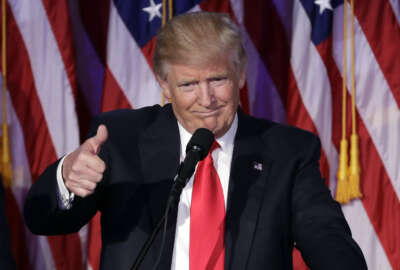

Rep. Don Beyer (D-Va.) plans to continue his fight for the federal workforce, after winning re-election. He'll join his fellow Virginia Democrat Gerry Connolly and...
Virginia Congressman Don Beyer (D) is looking to the next session with one thing on his mind — defense.
Whether it’s throwing support behind a federal pay raise or shoring up strength for negotiations with a new administration, Beyer fold Federal News Radio he is going to protect the government workforce.
“We have to play careful defense,” said Beyer, who won his race in Northern Virginia’s 8th District. “I, with President Obama, would like President-Elect Trump to be a good and effective leader. I want him to be a good president and part of that will be respecting our workforce and elevating them. Too often in the past, presidents-elect have come in having beaten up the federal workforce through the election, and blamed everything on government workers or a bloated workforce. Yet we have fewer federal workers per U.S. citizen than we’ve had in our lifetimes, and we get ever more efficient, ever leaner. I want to make sure that we’re protecting the people that are left.”
The administration change isn’t until January, but Congress returns in mid-November. Beyer said he wants to see resolution on the National Defense Authorization Act, which is currently in conference.
Within the NDAA is an amendment that would allow government buyers to avoid the lowest-price technically acceptable (LPTA) methodology.
“This is the provision that drives government contractors crazy,” Beyer said. “It literally takes the discretion out of the hands of our federal workers, or federal purchasing agents, the experts, to make the decision they think is best for the taxpayer.”
Beyer said among his long-term priorities is making sure federal employees “share in the growth of the economy, just as much as our private sector ones do.”
“They had frozen income for three years and then very minimal raises,” Beyer said. “We’d like to help them catch up.”
Beyer said he’d also like to see future oversight and investigations not turn into witch hunts.
“I want to make sure that we do oversight in a way that is effective investigative work, holding people accountable, but always done with respect for individuals and for truth,” Beyer said. “Working with our Republican members, we’ll try to make sure that the government is managed well. When there are things that go wrong, we need to — in an appropriate way, with due process — hold people accountable.”
Helping Beyer represent federal workers and government contractors — many of whom live and work in Northern Virginia — is Rep. Gerry Connolly (D-Va.), who ran unopposed in the 11th District, and incumbent Rep. Barbara Comstock (R- Va.) who also won her race.
Don Kettl, a professor at the University of Maryland’s School of Public Policy, said lawmakers on both sides of the aisle, and especially those near the D.C. area, are going to have to address the issue of “draining the swamp,” which was proposed by President-elect Donald Trump.
“There have been a lot of promises to try to make big changes,” Kettl said. “There’ve been very specific ideas, including the hiring freezes, the hiring and firing kinds of challenges to try to convert more federal employees to at-will employment. There will almost certainly be more pressures to increase government contracting. All of those are going to be very hot and very radioactive issues.”
Democrats will need to put a position together on those threatening issues, Beyer especially, because of the number of feds in his district, Kettl said.
Bob Tobias, a professor in American University’s Key Executive Leadership Program, said one of the challenges for Beltway lawmakers, is that most members of Congress, “are not really interested in federal employees and their issues.”
“They have other priorities on their mind, so getting their attention on these issues, unless there’s … publicity involved when an agency makes a mistake, most members of Congress don’t put these issues on the top of their priority list,” Tobias said.
But Beyer said the federal workforce should be important to everyone.
“Everything that we depend on our federal government for: your protection from terrorists overseas, protection from enemies within; an emphasis on not just K-12 education but on Fulbright (scholarships) and higher education; our wonderful transportation system; a lot of health and safety standards that have brought workplace accidents to an all-time low; even managing alcohol, tobacco and firearms, all of these things are done by federal employees who study after study show they work for less money for the federal government than they could make in the private sector,” Beyer said. “So they are all sacrificing to work for us, we owe them a great debt of gratitude and we especially owe them respect.”
Read the latest news about the incoming administration on our Tracking the Transition page.
Copyright © 2025 Federal News Network. All rights reserved. This website is not intended for users located within the European Economic Area.

